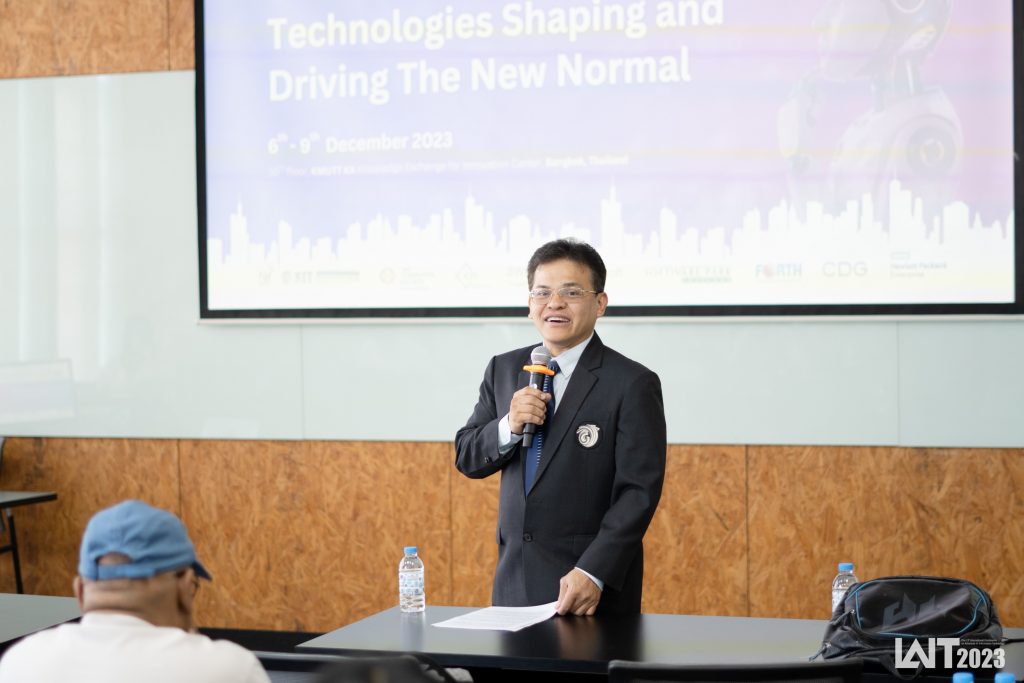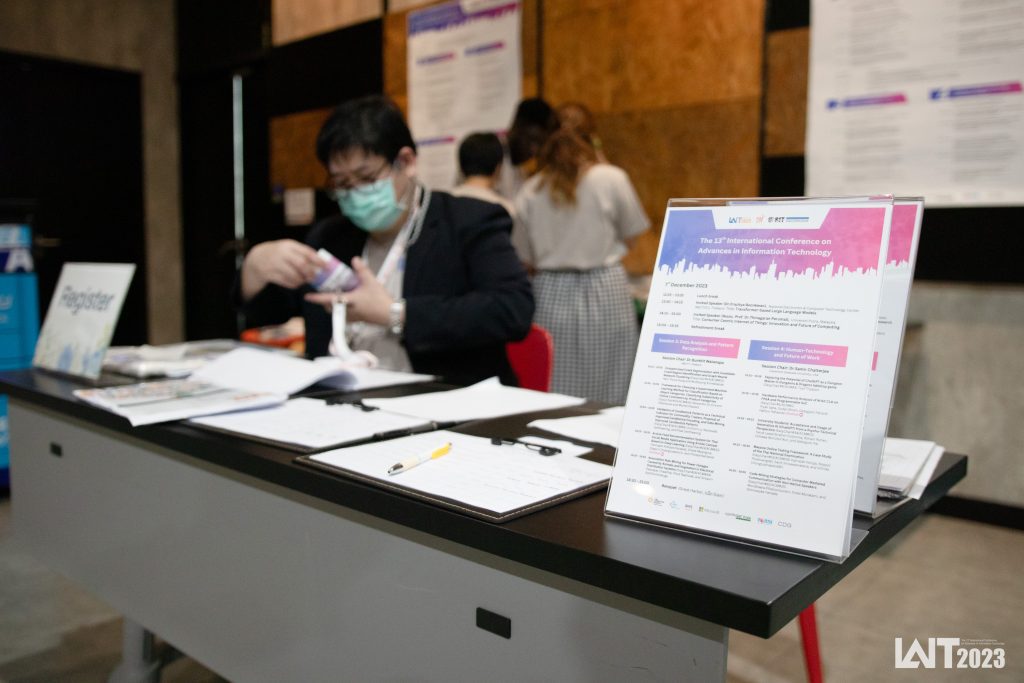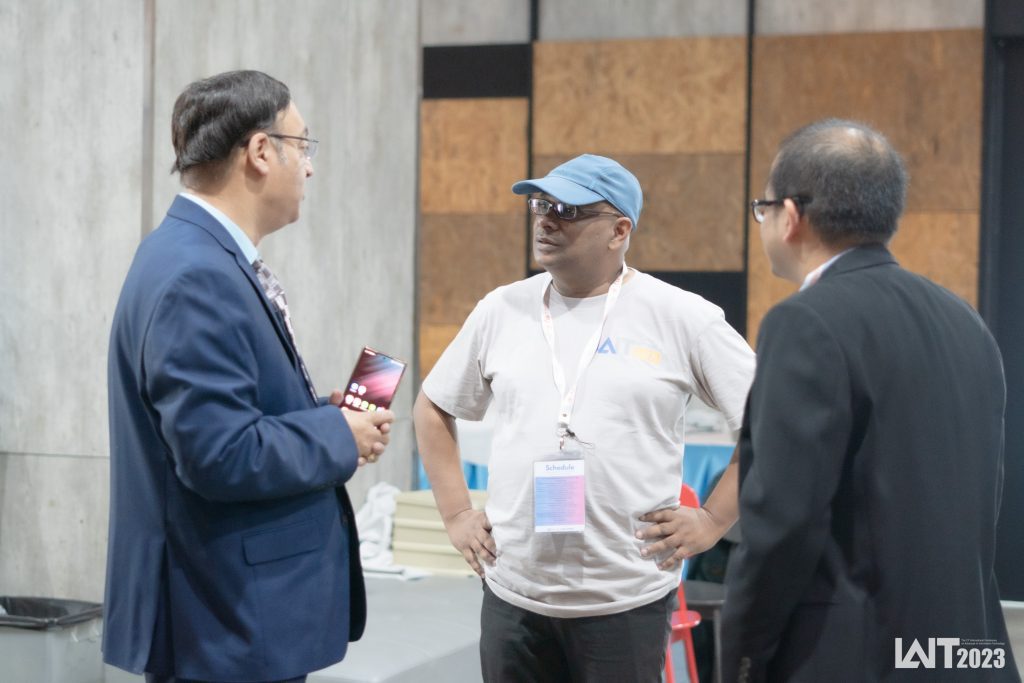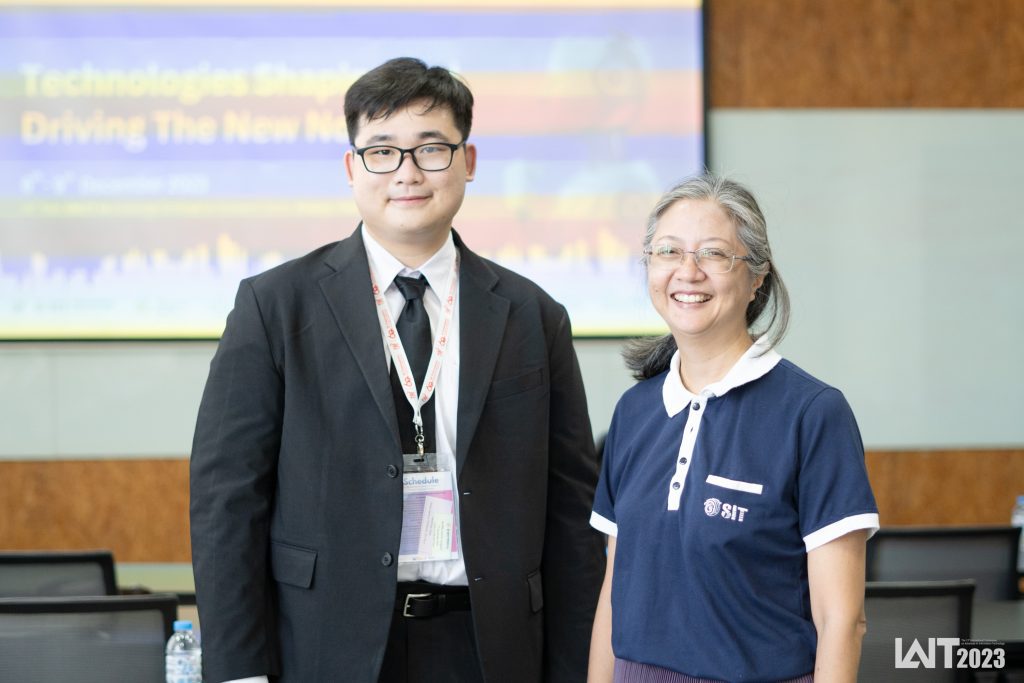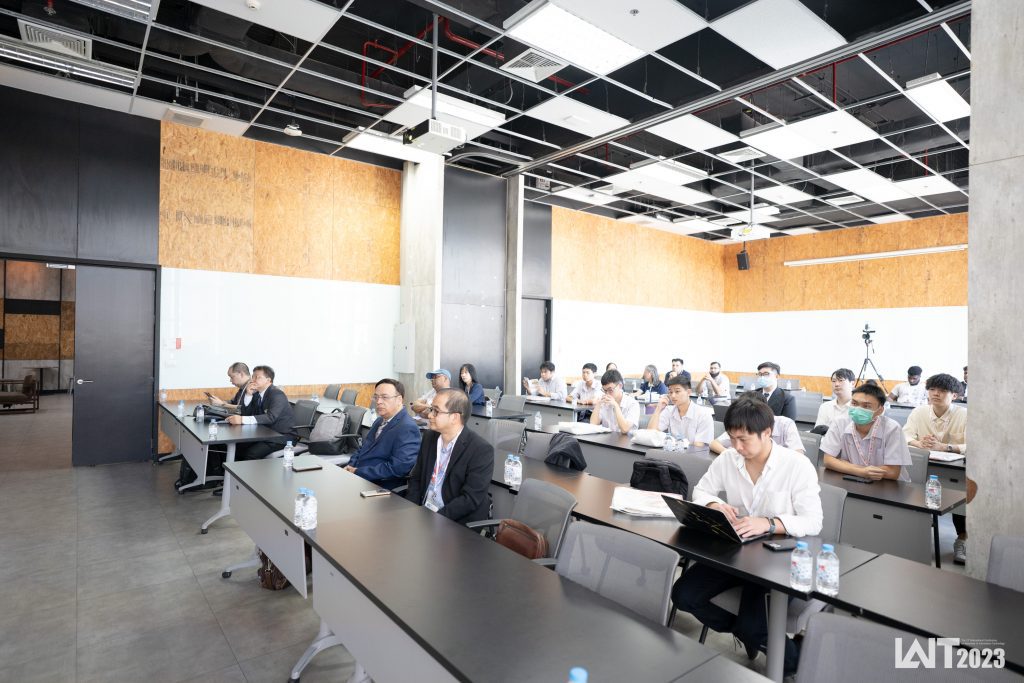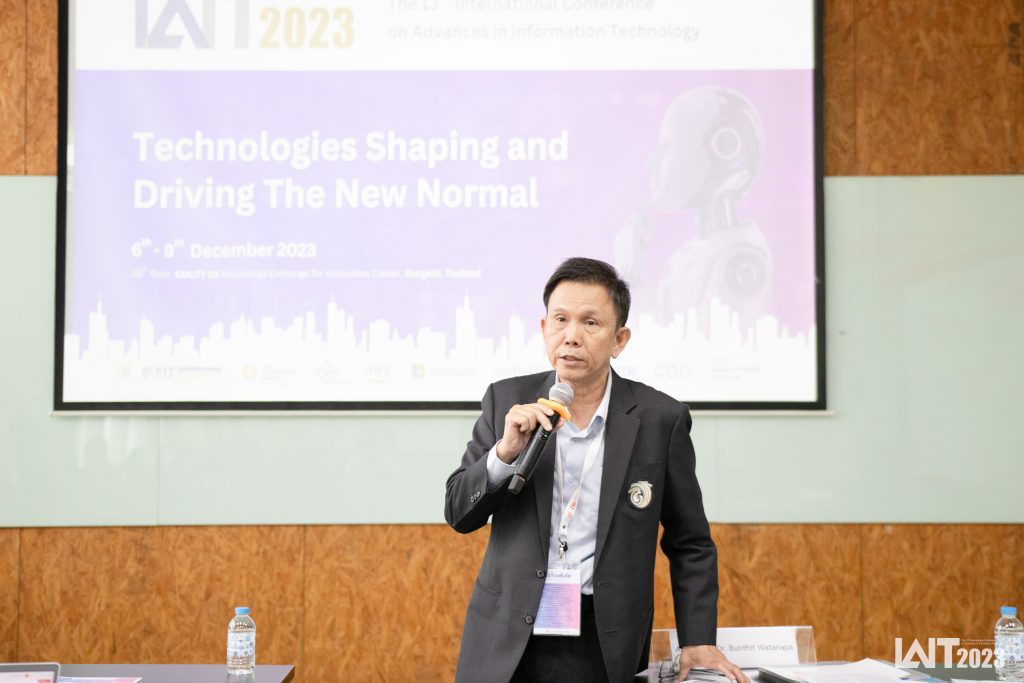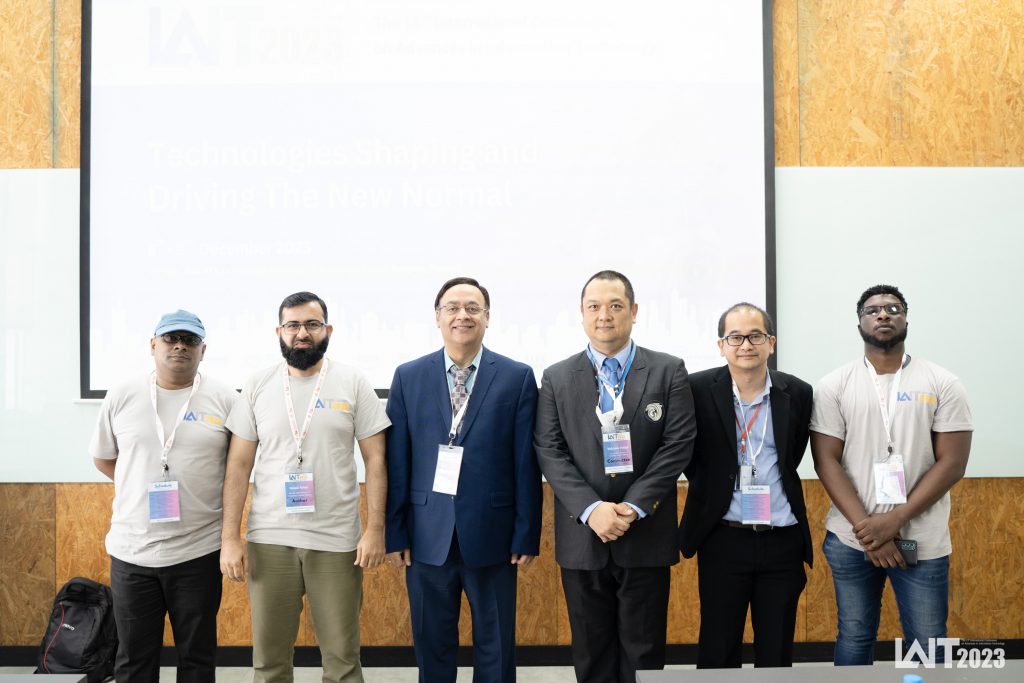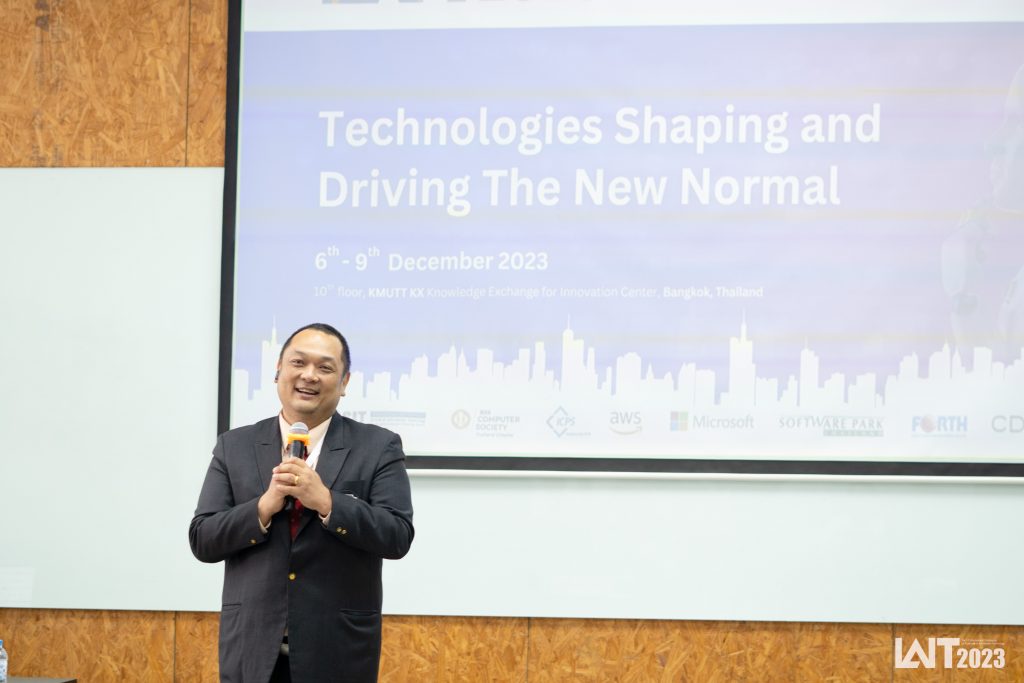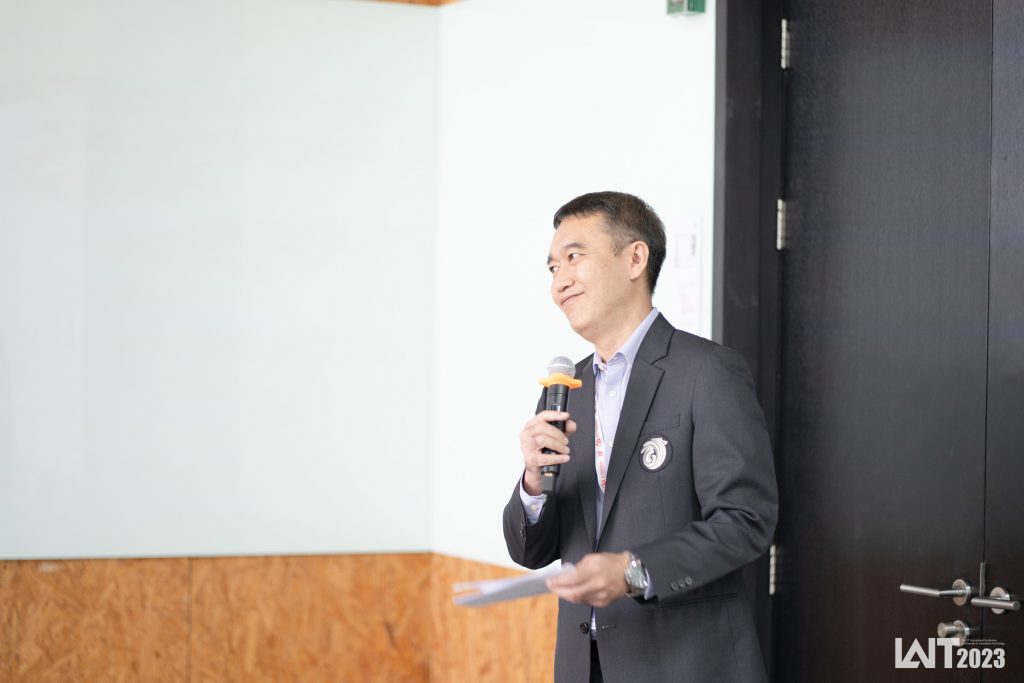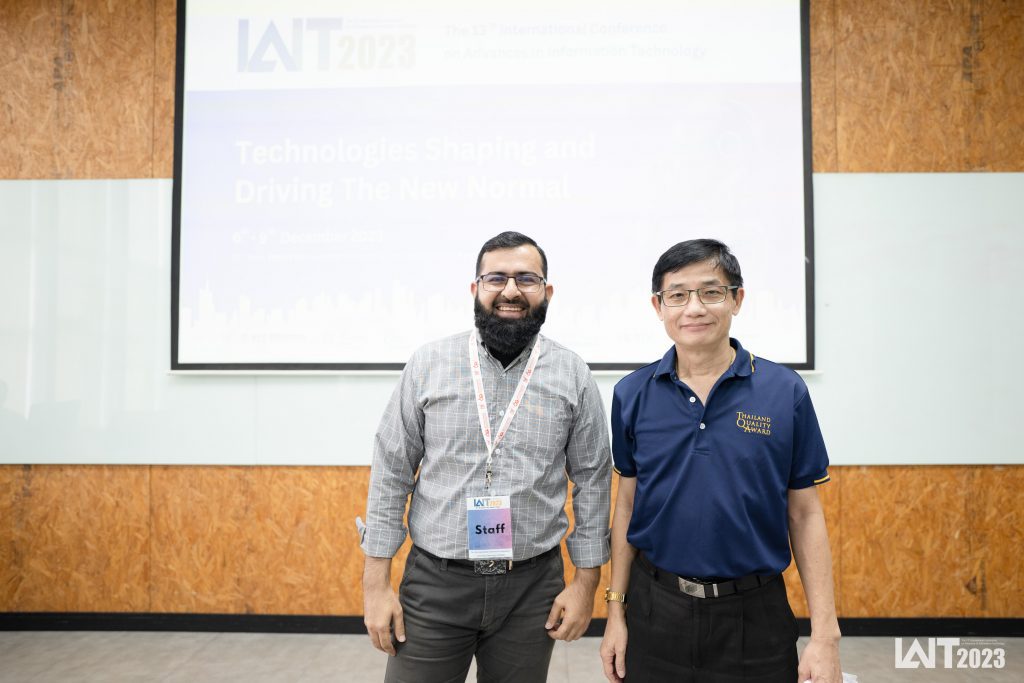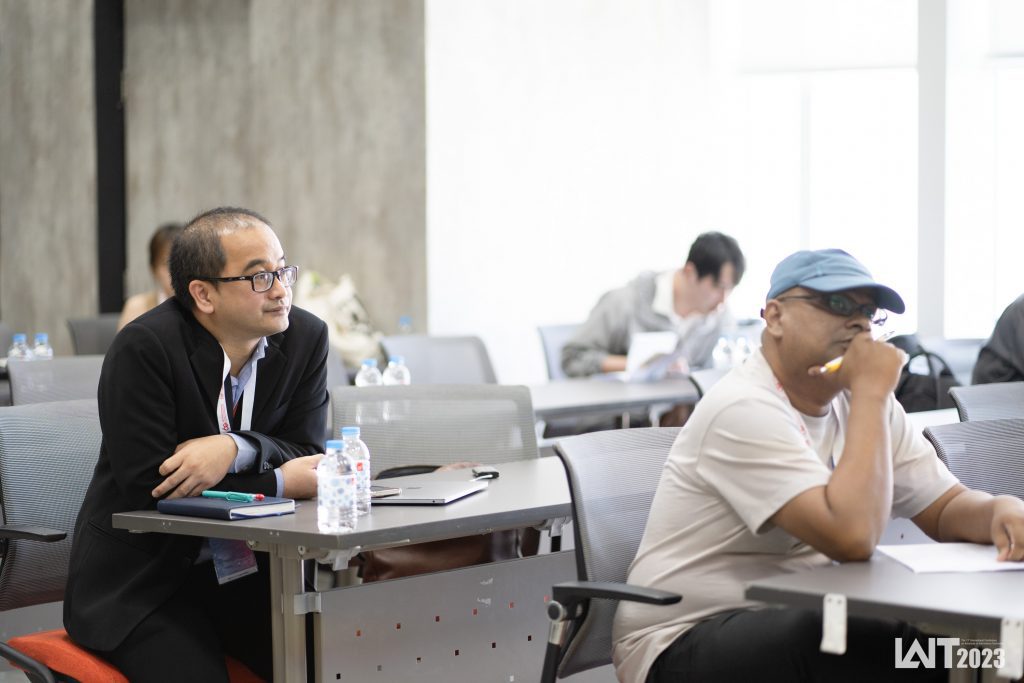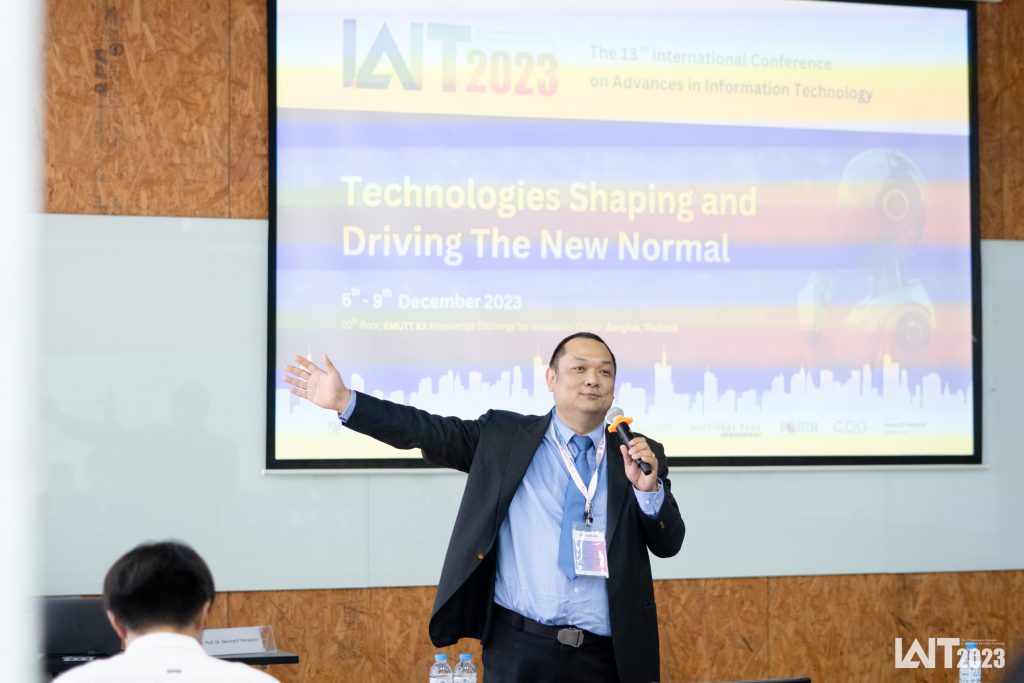The 13th International Conference on Advances in Information Technology (IAIT2023)
The 13th International Conference on Advances in Information Technology (IAIT2023)
6th - 9th December 2023, Bangkok, Thailand.
Bangkok, Thailand. (Hybrid conferences)
- 00Days
- 00Hours
- 00Minutes
- 00Seconds
Digital Transformation:
Technologies Shaping and Driving the New Normal
About
The International Conference on Advances in Information Technology (IAIT2023) provides a huge opportunity for researchers, PhD students, academics, and industry professionals around the world to share their knowledge and work with the research community. IAIT2023 will be the 13th in the series and organized by the School of Information Technology, King Mongkut’s University of Technology Thonburi, Bangkok, Thailand. The theme for 2023 is “Digital Transformation: Technologies Shaping and Driving the New Normal”. The COVID-19 pandemic has accelerated the growth and adoption of new technologies and digital products worldwide due to which organizations are focusing on emerging technologies like AI/ML, cybersecurity, data science, etc. The pandemic has shown us that in every sector ranging from healthcare, education, retail, finance to transportation; companies and organizations that have adopted digital initiatives and emerging technologies have become sustainable and kept themselves ahead of the learning curve. Therefore, in this upcoming edition of the conference we plan to focus on these digital transformation aspects and how these may impact the people and society. By incorporating a variety of related topics, IAIT2023 aims to create and promote more inter-departmental and inter-disciplinary research ideas and knowledge.
Recent Updates
>> IAIT2023 proceedings are now available in ACM digital library and can be accessed from here.
>> All the authors are invited to submit the extended version of their work to the Special Issue of “Unintended consequences and impacts of emerging technologies” in the International Journal of Information Management Data Insights, a Scopus indexed Q1 journal published by Elsevier. The details of the scope and topics can be found at:
https://www.sciencedirect.com/journal/international-journal-of-information-management-data-insights/about/call-for-papers#unintended-consequences-and-impacts-of-emerging-technologieshere.
Track I
Artificial Intelligence and Computational Intelligence
» AI Assistance Systems
» Ambient Intelligence
» Artificial Intelligence for Brain Informatics
» Brain Computer Interface
» Computational Intelligence in action (IoT, Medical Systems, Military Systems, Navigation Systems, Telecommunication Systems and Consumer Electronics)
» Computer Vision in Medical Informatics
» Data Analysis and Pattern Recognition
» Social Implications of Technology
» Deep learning, and emerging models
Track II
Augmented, Virtual and Mixed Reality Applications
» 3D user interfaces
» 3D interaction in VR environments
» Design of Inclusive Systems
» Collaborative Thinking
» Human Modeling
» Game Design
» Creative Process
» Emotional and Affective Design
» Design for the Elderly
» Design of Inclusive Human-Machine Systems
» Inclusion for Real-world Applications
» Human diversity in the techno-sphere
» Applications of XR technologies in various domains like healthcare, education, and marketing
Track III
Wearable Technologies, Social and Affective Computing
» Wearable Devices in Sports and healthcare
» Digital Human Modeling
» Emotional User Experience
» Social and Organizational Computing
» Accessibility for the Elderly
» Aesthetics for Product and System Design
» Emotional Requirements in Product and System Design
» Kansei Engineering for Product and Service
» Affective computing
» Emotional Aspects in Social Networking System
» Ubiquitous Computing
» Cognitive Systems Engineering
Track IV
Human-Technology and Future of Work
» HCI Design Theories and Methods
» User Experience (UX) and Usability Evaluation of Emerging Technologies and Services
» Human Cyber Physical Systems Interactions
» Novel Interaction Technology
» Models for Cyber Physical Systems
» Interactions and Visualization of Data
» Emerging Ubiquitous, Handheld, and Context-aware Interactions
» Human Data Interaction with IoT
» Assistive and Companion Technologies
» Technology and Knowledge Management
» Interactive and Digital Media
» Human Factors and Human Performance Modelling
Track V
Digital Leadership, Strategies and Smart Society
» Digital Strategy Formulation
» Agile Methodologies
» Design Thinking
» Effective Technologies for Society 5.0
» Data-driven Entrepreneurship and Sustainability
» Social Networks and Modelling Applications
» Smart Society 5.0 for Social and Technological Sustainability
» Emerging Technologies and their Applications for a New Human-centered Society
» E-governance: Economics and Development
» Smart Manufacturing
» Scalability of Digital Entrepreneurship addressing Global Challenges
» Web Intelligence and Recommender Systems
Track VI
Cybersecurity, Privacy and AI
» AI/CS Security (e.g., adversarial machine learning)
» Autonomous Vehicles and Devices
» Blockchain and Distributed Ledger Security
» Cloud Computing and DevOps
» Data Governance
» Cyber Threat Intelligence
» Digital Forensics
» Privacy and Risks in VR/AR/Metaverse
» AI for Detecting and Preventing issues like Cyber-harassment, Suicide, Sexting, etc.
» Privacy-Preserving AI
» Artificial Intelligence and Cyber Analytics
Track VII
Data and Software Engineering
» Data Flow and Streaming for Realtime AI
» ETL and Data Operations on Data Lake
» Data Modelling and Engineering for Big Data
» Data-driven Decision Making
» Advancements in Agile Software Development
» AI for Software Engineering and Management
IMPORTANT DATES
PROGRAM
IAIT2023: 6th December (Registration open from 10:00 to 16:00)
IAIT2023: 7th December 2023
8:30 - 9:00
Opening Ceremony
9:00 - 9:45
Keynote Speaker (Prof. Dr. Samir Chatterjee)
Claremont Graduate University, United States
Title: Towards Human Flourishing Using Artificial Intelligence and Digital
Consciousness
9:45 - 10:30
Keynote Speaker (Assoc Prof. Dr. Supavadee Aramvith)
Chulalongkorn University, Thailand
Title: Multimedia Analytics and Processing Research Unit
10:30 - 10:45
Refreshment break
Session 1 : AI-based Assistance Systems
Session Chair: Dr. Thinagaran Perumal
Universiti Putra, Malaysia
(10th Floor, Room X01)
Join Zoom Meeting
Here
10:45 - 11:05
| Enhancing Novelty in ChatGPT Responses: Incorporating Random Word Brainstorming (EasyChair#2/ACM#2) |
11:05 - 11:25
| Am I Fighting Well? Fighting Game Commentary Generation With ChatGPT (EasyChair#45/ACM#14) |
Chollakorn Nimpattanavong, Pittawat Taveekitworachai, Ibrahim Khan, Thai Van Nguyen, Ruck Thawonmas, Worawat Choensawat and Kingkarn Sookhanaphibarn
11:25 - 11:45
| Adaptive Background Music According to the Player’s Arousal for DareFightingICE (EasyChair#50/ACM#34) |
11:45 - 12:05
| A Modified Snake Optimizer Algorithm with Otsu-based Method for Satellite Image Segmentation (EasyChair#57/ACM#26) |
12:05 - 12:25
| SpreadQuery: A User-Friendly Database Query System Utilizing Spreadsheet Software (EasyChair#49/ACM#24) |
Session 2: Digital Leadership, and Technologies for Society 5.0
Session Chair: Dr. Debajyoti Pal
KMUTT, Thailand
(10th Floor, Room X02)
Join Zoom Meeting
Here
10:45 - 11:05
| Formulating Analytical Governance Frameworks: An Integration of Data and AI Governance Approaches (EasyChair#12/ACM#7) |
11:05 - 11:25
| Digital Space Economic Transformation Design: An Innovation Ecosystem Approach (EasyChair#17/ACM#20) |
11:25 - 11:45
| Detecting New Points of Interest Using Taxi GPS Data (EasyChair#47/ACM#40) |
11:45 - 12:05
| Minecraft Video Aesthetics Quality Assessment Model (EasyChair#23/ACM#35) |
Ryosuke Hasegawa, Lian Yu, Jun Tanabe and Ruck Thawonmas
12:05 - 12:25
| Unlocking the Black Box: Exploring the use of Generative AI (ChatGPT) in Information Systems Research (EasyChair#37/ACM#17) |
12:25 - 13:25
Lunch break
13:30 - 14:15
Invited Speaker (Dr. Prachya Boonkwan)
National Electronics and Computer Technology Center (NECTEC), Thailand
Title: Transformer-based Large Language Models
14:15 - 15:00
Invited Speaker (Assoc Prof. Dr. Thinagaran Perumal)
Universiti Putra, Malaysia
Title : Consumer Centric Internet of Things: Innovation and Future of Computing
15:00 - 15:15
Refreshment break
Session 3: Data Analysis and Pattern Recognition
Session Chair: Dr. Bunthit Watanapa
KMUTT, Thailand
(10th Floor, Room X01)
Join Zoom Meeting
Here
15:15 - 15:35
| Unsupervised Crack Segmentation with Candidate Crack Region Identification and Graph Neural Network Clustering (EasyChair#14/ACM#31) |
15:35 - 15:55
| Framework for Choosing a Supervised Machine Learning Method for Classification Based on Object Categories : Classifying Subjectivity of Online Comments by Product Categories (EasyChair#15/ACM#18) |
15:55 - 16:15
| Validation of Candlestick Patterns as a Technical Indicator for Commodity Traders, Proposal of Improved Candlestick Encoding, and Data Mining Improved Candlestick Patterns (EasyChair#16/ACM#9) |
16:15 - 16:35
| Article Feed Recommendation System for Thai Social Media Application Using Article Context Based on Deep Learning (EasyChair#19/ACM#12) |
16:35 - 16:55
| Association Rule Mining for Power Outages Caused by Animals and Vegetation in Electrical Distribution Systems (EasyChair#28/ACM#39) |
Session 4: Human-Technology and Future of Work
Session Chair: Dr. Samir Chatterjee
Claremont Graduate University, USA
(10th Floor, Room X02)
Join Zoom Meeting
Here
15:15 - 15:35
| Exploring the Potential of ChatGPT as a Dungeon Master in Dungeons & Dragons tabletop game (EasyChair#4/ACM#3) |
15:35 - 15:55
| Hardware Performance Analysis of N-bit CLA on FPGA and Programmable SoC (EasyChair#1/ACM#1) |
15:55 - 16:15
| University Students’ Acceptance and Usage of Generative AI (ChatGPT) from a Psycho-Technical Perspective (EasyChair#34/ACM#15) |
16:15 - 16:35
| Massive Online Testing Framework: A Case Study of the Thai National Examination (EasyChair#53/ACM#36) |
Vajirasak Vanijja, Noppol Pilukruangdet, Sanit Sirisawatvatana and Vithida Chongsuphajaisiddhi
16:35 - 16:55
| Code-Mixing Strategies for Computer Mediated Communication with Non-Native Speakers (EasyChair#65/ACM#25) |
18:30 - 21:00
Banquet (Great Harbor, 6th Floor Icon Siam)
IAIT2023: 8th December 2023
9:00 - 9:45
Invited Speaker (Assoc. Prof. Dr. Eugene Aw Cheng Xi)
UCSI University, Malaysia
Title: Generative AI for tomorrow’s marketing: Future research agenda
9:45 - 10:30
Invited Speaker (Assoc Prof. Dr. Sansanee Auephanwiriyakul)
Chiang Mai University, Thailand
Title: String Grammar Fuzzy Clustering in Data Analysis
10:30 - 10:45
Refreshment break
Session 5: Machine/Deep Learning in Healthcare and Medical Informatics
Session Chair: Dr. Chonlameth Arpnikanondt
KMUTT, Thailand
(10th Floor, Room X01)
Join Zoom Meeting
Here
10:45 - 11:05
| Predicting Three Types of Freezing of Gait Events Using Deep Learning Models (EasyChair#62/ACM#30) |
11:05 - 11:25
| A Data-Driven Approach to Detect Dehydration in Afghan Children Using Deep Learning (EasyChair#11/ACM#6) |
Ziaullah Momand, Debajyoti Pal and Pornchai Mongkolnam
11:25 - 11:45
| Segment-based and Patient-based Segmentation of CTPA Image in Pulmonary Embolism using CBAM ResU-Net (EasyChair#22/ACM#21) |
11:45 - 12:05
| Predicting Blood Drop Height and Volume using Physics Equations, VGG-19, and XGBoost (EasyChair#25/ACM#22) |
12:05 - 12:25
| ClusteredSHAP: Faster GradientExplainer based on K-means Clustering and Selections of Gradients in Explaining 12-Lead ECG Classification Model (EasyChair#51/ACM#27) |
Session 6: AI and Computational Intelligence
Session Chair: Dr. Vajirasak Vanijja
KMUTT, Thailand
(10th Floor, Room X02)
Join Zoom Meeting
Here
10:45 - 11:05
| Scenario Fidelity and Perceived Driver Mental Workload: Can Workload Assessment be Crowdsourced? (EasyChair#5/ACM#4) |
11:05 - 11:25
| Power and Delay Efficient Hardware Implementation with ATPG for Vedic Multiplier Using Urdhva Tiryagbhyam Sutra (EasyChair#36/ACM#23) |
11:25 - 11:45
| Alaryngeal Speech Generation Using MaskCycleGAN-VC and Timbre-Enhanced Loss (EasyChair#58/ACM#32) |
11:45 - 12:05
| Impact of Different Discrete Sampling Strategies on Fitness Landscape Analysis Based on Histograms (EasyChair#63/ACM#28) |
12:05 - 12:25
| Randomization of Low-discrepancy Sampling Designs by Cranley-Patterson Rotation (EasyChair#64/ACM#29) |
12:25 - 13:25
Lunch break
13:30 - 14:15
Keynote Speaker (Prof. Dr. EL-Sayed M. EL-Alfy)
University of Petroleum and Minerals (KFUPM), Saudi Arabia
Title: Edge Intelligence and Deep Learning Applications (online)
14:15 - 14:30
Refreshment break
Session 7: Deep learning and its Various Applications
Session Chair: Dr. Pisal Setthawong
Assumption University, Thailand
(10th Floor, Room X01)
Join Zoom Meeting
Here
14:30 - 14:50
| Spam Article Detection on Social Media Platform Using Deep Learning: Enhancing Content Integrity and User Experience (EasyChair#10/ACM#5) |
14:50 - 15:10
| Impact of External Factors on Air Passenger Demand Prediction Using Machine Learning (EasyChair#13/ACM#8) |
15:10 - 15:30
| Dual-Stage OOD Detection Learning with an Unsupervised Start (EasyChair#31/ACM#10) |
15:30 - 15:50
| Automated Stock Trading System using Technical Analysis and Deep Learning Models (EasyChair#46/ACM#37) |
Weerapat Buachuen and Pittipol Kantavat
15:50 - 16:10
| Attention-driven Text-guided Image Manipulation (EasyChair#54/ACM#33) |
Session 8: Data and Software Engineering, and Cybersecurity
Session Chair: Dr. Eugene Aw Cheng Xi
UCSI University, Malaysia
(10th Floor, Room X02)
Join Zoom Meeting
Here
14:30 - 14:50
| Khmer Calligraphy Style Transfer Using SkelGAN (EasyChair#26/ACM#19) |
14:50 - 15:10
| An Implementation of Phrase Fill-in-blank Problem for Test Code Reading Study in Java Programming Learning Assistant System (EasyChair#18/ACM#38) |
15:10 - 15:30
| Exploring User Experience with Voice Assistants: Impact of Prior Experience on Voice Assistants. (EasyChair#44/ACM#11) |
15:30 - 15:50
| Designing a vulnerability threat detection scanner with the use of machine learning models (EasyChair#35/ACM#16) |
15:50 - 16:10
| Enhancing Cybersecurity Resilience: A Comprehensive Analysis of Human Factors and Security Practices Aligned with the NIST Cybersecurity Framework (EasyChair#42/ACM#13) |
16:30
Closing ceremony and Prize Distribution (Best paper + Best presented paper/session)
IAIT2023: 9th December
Ayutthaya Full Day Tour (Roundtrip)
Visit “Thailand’s World Heritage (Additional Payment Needed)“
PAPER SUBMISSION
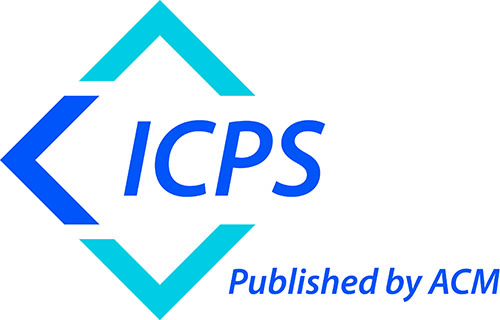
Prospective authors are invited to submit original, high-quality manuscripts strictly formatted as per the new ACM Proceedings Template (downloadable from: https://authors.acm.org/proceedings/production-information/preparing-your-article-with-microsoft-word) or available at “ACM Proceedings Template“. The submitted manuscripts should have a minimum of 5 pages. Although there is no strict upper bound on the number of pages, we recommend having a maximum of 10 pages for expediting the review process. Kindly note that there are no overlength charges.
Paper submissions can be made via EasyChair at the following link: https://easychair.org/conferences/?conf=iait2023. All the submissions must be done both in the PDF format along with the source files (either Word or LaTeX files). Since IAIT follows a strict double-blind peer-review process it is requested that the authors should not include their names and affiliations or any other personal identifiable information while submitting the initial version of the manuscript for review. Upon acceptance they will be allowed to include all the relevant information for which further instructions will be given.
Review Process :
IAIT follows a strict and rigorous double-blind peer review process wherein each submitted manuscript will be reviewed by at least 3 reviewers who are experts in their respective domains. The authors are expected to receive the full review within 30 days of their initial submission. Before final acceptance the authors need to revise their manuscripts, taking into consideration the referees’ comments and suggestions. All the revised manuscripts will undergo a second round of peer review process (if possible, by the same reviewers) before inclusion in the conference proceedings. The authors will be given 15 days to revise their manuscript for resubmission.
The submission of a paper implies that it is original and has not been submitted and published elsewhere or currently under consideration somewhere else. In addition, at least one full registration is required per accepted paper, and it must be presented by an author if accepted.
REGISTRATION FEE
Audience/Attendee
_________________
(no banquet)
$200
- Each publication requires at least one full registration. Kindly note that one full registration will include up to 2 accepted papers (must be from the same corresponding author).
- Only student registration is not allowed for the paper to be included in the proceedings, i.e., student registration is only optional and in addition to a full registration.
- A copy of the student ID is required to register with the student rate.
- Receipt of the payment confirmation and bill will be issued with the final amount of money that the conference organizer receives at the end point.
ATTENDANCE IS MANDATORY TO PUBLISH IN THE PROCEEDINGS :
You must attend the conference and present your paper if you want to publish your paper in the Proceedings.
NOTE for NON-AUTHOR ATTENDEES :
We do make invitation letters for non-author attendees, if they have valid reason to attend our conferences and satisfy certain requirements. Please contact us at iait2023@kmutt.ac.th regarding this.
KEYNOTE SPEAKERS

Dr. El-Sayed M. El-Alfy
The Information and Computer Science Department, College of Computing and Mathematics, King Fahd University of Petroleum and Minerals (KFUPM), Saudi..Arabia
Biography :
EL-SAYED M. EL-ALFY is currently a professor at the Information and Computer Science Department, College of Computing and Mathematics, King Fahd University of Petroleum and Minerals (KFUPM). He also a Fellow of SDAIA-KFUPM Joint Research Center for Artificial Intelligence, and affiliated with the Interdisciplinary Research Center for Intelligent Secure Systems (IRC-ISS). He has more than 25 years of experience in industry and academia, involving research, teaching, supervision, curriculum design, program assessment, and quality assurance in higher education. He is an approved ABET/CSAB Program Evaluator (PEV), an NCAAA reviewer, and a consultant for several universities and research agents in various countries. He has chaired the Quality Assurance Committee and led the ABET accreditation process in the Department of Information and Computer Science at KFUPM for several years. He is an active researcher with interests in fields related to machine learning and nature inspired computing and their applications to intelligent systems and cybersecurity analytics. His work has been internationally recognized, received a number of awards, and appeared in the Stanford University World’s Top 2% of Scientists List. He has published numerously in peer-reviewed journals and conferences, edited a number of books published by reputable international publishers, attended and contributed in the organization of many world-class conferences, delivered a number of invited talks and keynote speeches, and supervised master and Ph.D. students. Dr. El-Alfy is a senior member of IEEE and was also a member of ACM, IEEE Computational Intelligence Society, IEEE Computer Society, IEEE Communication Society, and IEEE Vehicular Technology Society. He has served as a Guest Editor for a number of special journal issues, and in the editorial board of a number of international journals, including IEEE/CAA Journal of Automatica Sinica, IEEE Transactions on Neural Networks and Learning Systems, International Journal of Trust Management in Computing and Communications, and Journal of Emerging Technologies in Web Intelligence (JETWI).
Title : Edge Intelligence and Deep Learning Applications
In the current era of digital transformation, several advances have been made in cloud computing, mobile networking and 5G/6G in Internet-of-Things. With the requirements for reduced latency, limited and intermittent connections, and strict requirements for data privacy and security, computing and intelligence is shifting from the cloud towards the edge devices where data is generated. This allows quicker decision making and empowers real-time applications such as autonomous vehicles, remote monitoring, and smart environments. In this talk, we will present an overview of edge intelligence and deep learning and their opportunities and challenges and how they can affect the future of Internet-of-Things. We will review current and emerging state of the field and various architectures to support smart applications and demonstrate some use cases.
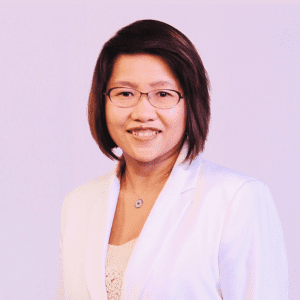
Dr. Supavadee Aramvith
Department of Electrical Engineering, Chulalongkorn University, Thailand
Biography :
Supavadee Aramvith received the B.S. (first class honors) degree in Computer Science from Mahidol University in 1993. She received the M.S. and Ph.D. degrees in Electrical Engineering from the University of Washington, Seattle, USA, in 1996 and 2001, respectively. She joined Chulalongkorn University in June 2001. Currently, she is an Associate Professor at Department of Electrical Engineering with specialization Video Technology. She has successfully advised 14 Ph.D., 30 Master’s, and 41 Bachelor’s Graduates. She published over 130 papers in International Conference Proceedings and Journals with 4 International Book Chapters. She has rich project management experiences as the project leader and former technical committee chairs to the Thailand Government bodies in Telecommunications and ICT. She is very active in the international arena with the leadership positions in the international network such as JICA Project for AUN/SEED-Net, and the professional organizations such as IEEE, IEICE, APSIPA, and ITU.
Title : Multimedia Analytics and Processing Research Unit
In this talk, we will present and discuss the current trends and researches in video analytics. As surveillance cameras have been widely installed worldwide, although the main purpose of those cameras is for monitoring, but the most important task is to be able to analyze video contents and extract useful information. Artificial Intelligence (AI) and Deep learning–based computer vision techniques utilizing multi-layer neural network is drastically improving the performance of video analytics to a certain extent. Several on-going researches on deep learning-based video analytics such as image super resolution, real-time multiple face recognition system, video anomaly detection and several implementations of embedded video analytic system on FPGA and Single Board Computers will be discussed. Some use cases of utilizing video analytics will also be mentioned.

Dr. Samir Chatterjee
Center for Information Systems & Technology, Claremont Graduate University, United States
Biography :
Dr. Samir Chatterjee is a Professor and Fletcher Jones Chair of Technology Management and Design at Claremont Graduate University. He is also visiting Professor of Design & Innovation at the Iovine and Young Academy at University of Southern California. He has published over 165 peer reviewed articles in Information Systems, Healthcare Informatics and Computer Science area. He is one of the highly cited IS professors (over 17,421 citations, h-index of 31 and i10-index of 67). He is Editor-in-Chief of Health Systems journal and also serves on the editorial board of Journal of AIS, Information Systems Research (ISR) and guest-edited many special issues in numerous other journals including IEEE and ACM. He has been an AE of MIS Quarterly. He is the author of the best-selling book on Design Research in Information Systems and is the founding father of the DESRIST International conference focusing on the science of design. He regularly serves as chair or member of the technical program committee on numerous IEEE, ACM and AIS conferences. His research has been funded by NSF, NIH, MDTRC, Georgia Research Council, Loma Linda Hospital, Northrop Grumman, The California Endowment and others. He is Founder & CEO of DCL Health, a wireless healthcare startup. He has been awarded the distinguished lifetime achievement award for contributions to Design Science Research, by the IS design community, appointed the Schoeller Senior Fellow 2017 by Dr. Theo and Friedl Schoeller Research Center for Business and Society in Nuremberg Germany and recipient of the Mahatma Gandhi Pravasi Samman, an award given by NRI Welfare Society of India in recognition of the high accomplishments of Indians living outside of India. When he is not doing science and design, he is a music producer, a voting member of the Grammys and he lives with his wife and son in southern California.
Title : Towards Human Flourishing Using Artificial Intelligence and Digital Consciousness
INVITED SPEAKERS

Dr. Sansanee Auephanwiriyakul
Computer Engineering Department, Faculty of Engineering, Biomedical Engineering Institute, Chiang Mai University, Thailand
Biography :
Sansanee Auephanwiriyakul (S’98–M’01) received the B.Eng. (Hons.) degree in electrical engineering from the Chiang Mai University, Thailand (1993), the M.S. degree in electrical and computer engineering and Ph.D. degree in computer engineering and computer science, both from the University of Missouri, Columbia, in 1996, and 2000, respectively. After receiving her Ph.D. degree, she worked as a post-doctoral fellow at the Computational Intelligence Laboratory, University of Missouri-Columbia. She is currently an Associate Professor in the Department of Computer Engineering and a deputy director of the Biomedical Engineering Institute, Chiang Mai University, Thailand. Dr. Auephanwiriyakul is a senior member of the Institute of Electrical and Electronics Engineers (IEEE). She is an Associate Editor of the IEEE Transactions on Fuzzy System, the IEEE Transactions on Neural Networks and Learning Systems, IEEE Computational Intelligence Magazine, IEEE Transactions on Artificial Intelligence, Engineering Applications of Artificial Intelligence, and ECTI Transactions on Computer and Information Technology. She was a general chair of the IEEE International Conference on Computational Intelligence in Bioinformatics and Computational Biology (CIBCB 2016). She will be a general chair of the IEEE World Congress on Computational Intelligence (WCCI) 2024 (IEEE International Conference on Fuzzy Systems 2024). She was a Technical Program Chair, Organizing Committee in several major conferences including the IEEE International, Conference Fuzzy Systems. She is also a member of several important IEEE CIS technical committees.
Title : String Grammar Fuzzy Clustering in Data Analysis
Data Analysis is a process to analyze data in terms of representing, describing, evaluating, interpreting data using statistical methods. What if the data do not come in the form of statistical representation or a vector of numbers but are in the form of syntactic data, how do we analyze those data? One of the pattern recognition research branches is the syntactic pattern recognition that is able to deal with this type of data set. Each sample in syntactic data set is normally represented as a string. The strings in the same data set can have different lengths. Also, the string does not have any mathematical meaning that we can calculated as if they are vectors of numbers. There are several syntactic pattern recognition methods. However, one of the syntactic pattern recognition methods that is used in many applications is a string grammar clustering method since it is easily to implement and is understandable to humans. In this talk, we will introduce a set of string grammar clustering algorithms developed at Computational Intelligence Research Laboratory, Chiang Mai University. We also show applications of these algorithms in several real-world problems, e.g., sign language translation system, face recognition, and health applications.

Dr. Thinagaran Perumal
Department of Computer Science, Faculty of Computer Science and Information Technology, Universiti Putra, Malaysia
Biography :
Thinagaran Perumal is the recipient of 2014 Early Career Award from IEEE Consumer Electronics Society (now known as Consumer Technology Society) for his pioneering contribution in the field of consumer electronics. He completed his PhD at Universiti Putra Malaysia, in the area of smart technology and robotics. He is currently an Associate Professor at the Department of Computer Science, Faculty of Computer Science and Information Technology, Universiti Putra Malaysia. He is also currently appointed as Head of Intelligent Computing Research Group in the university and been elected as Chair of IEEE Consumer Technology Society Malaysia Chapter. His research interests are towards interoperability aspects of smart homes and Internet of Things (IoT), wearable computing, and cyber-physical systems. Thina is also heading the National Committee on Standardization for IoT (IEC/ISO TC / G/16) as Chairman since 2018. Some of the eminent works include proactive architecture for IoT systems; development of the cognitive IoT frameworks for smart homes and wearable devices for rehabilitation purposes. He is an active member of IEEE Consumer Technology Society and its Future Directions Committee on Internet of Things. He has been invited to give several keynote lectures and plenary talk on Internet of Things in various institutions and organizations internationally. He has published several papers in IEEE Conferences and Journals and is serving as TPC member for several reputed IEEE conferences. He is an active reviewer for IEEE Consumer Electronics Magazine, IEEE Internet of Things Journal, IEEE Communication Magazine, IEEE Sensors Journal, and IEEE Transaction for Automation Science and Engineering, to name a few. He was elected as General Chair for IEEE International Symposium on Consumer Electronics 2017 (ISCE’17) held in Kuala Lumpur.
Title : Consumer Centric Internet of Things: Innovation and Future of Computing
The Internet of Things (IoT) is a unique paradigm and is shaping the revolution of computing technologies. This will accelerate innovation by creating the means for objects or machines to communicate heterogeneous types of information among themselves and collaborate with peers to provide novel services. The IoT will empower consumers with better home automation, improved healthcare, intelligent transportation solutions and many more important services. Without doubt, most of the IoT technology and applications will directly or indirectly influence consumer industries. To compete in this new reality, consumer and users must now understand how their products are controlled by IoT ecosystems, which means understanding their application design, network communication, and platform architectures as well as the emerging paradigm of big data, security and privacy. The IoT initiatives and activities worldwide are mainly concentrated on architectures and protocols for efficient interconnection of heterogeneous objects and the creation of value-added services. This talk aims to explore those issues involved technologies of IoT, their application domain as well as to pursue the state-of-the-art and future directions of IoT.

Dr. Prachya Boonkwan
National Electronics and Computer Technology Center (NECTEC), Thailand
Biography :
Prachya Boonkwan received B.Eng. and M.Eng. degrees in Computer Engineering from Kasetsart University in 2002 and 2005, respectively. He received a Ph.D. degree in Informatics from the University of Edinburgh, UK, in 2014. Since 2005, he has been with Language and Semantic Technology Lab at National Electronics and Computer Technology Center (NECTEC) in Thailand. His research topics of interest include: large language models (LLMs), grammar induction, statistical parsing, natural language processing, machine learning, and formal syntax.
Currently, he is one of the leaders responsible for the OpenThaiGPT Project, which is a collaboration between NECTEC, Artificial Intelligence Association of Thailand (AIAT), and Artificial Intelligence Entrepreneur Association of Thailand (AIEAT). His role is to oversee the training operations for Thai large language models on LANTA, the high-performance computing resources at NECTEC, and the curation and cleansing of crawled textual datasets. The next milestone of the project is to enable multimodality and explainability in Thai LLMs.
Title : Transformer-based Large Language Models
Conversational agents, such as ChatGPT and Google Bard, are the revolutionary epitome of AI applications, where they offer a more natural approach to human-computer interaction via natural language. Under the hood, a user’s query is interpreted and transformed into an answer using end-to-end neural network models called ‘Large Language Model’ (LLM).
This talk explores the key aspects of these models: their architectures, training methods, and their impact on language understanding and generation. The topics include:
1. Introduction to Transformer models
2. Model interpretation and theoretical upper bounds
3. Large language models (LLMs)
4. BERT and its variants
5. Training a conversational agent
6. Advancement and future directions
7. Ethical and societal concerns
By the end of this talk, you will have a comprehensive understanding of the Transformer-based LLMs and how they are shaping the future of natural language processing and AI as a whole.

Dr. Eugene Aw Cheng Xi
UCSI Graduate Business School,
UCSI University, Malaysia
Biography :
Eugene Cheng-Xi Aw is an Associate Professor and Head of Research & Postgraduate Studies at the UCSI Graduate Business School, UCSI University, Malaysia. His current research work focuses on consumer behavior, influencer marketing, and branding. His research has been published in Journal of Advertising, Journal of Business Research, Technological Forecasting & Social Change, Computers in Human Behavior, Internet Research, Information Technology & People, Journal of Retailing and Consumer Services, Marketing Intelligence & Planning, International Journal of Contemporary Hospitality Management, Journal of Hospitality Marketing & Management, Tourism Management Perspective, among others. He is listed as one of the Top 2% World Scientists in the field of marketing for 2022 by Stanford University. In both 2020 and 2023, he was honored with the Emerald Literati Awards for Excellence: Outstanding Reviewer Award by the Asia Pacific Journal of Marketing and Logistics. In 2022, he won another Emerald Literati Awards for Excellence: Outstanding Reviewer Award 2022, conferred by Industrial Management & Data Systems. Currently, Eugene is a senior associate editor for Marketing Intelligence & Planning and an associate editor for The Bottom Line. He is guest-editing several special issues for the Journal of Consumer Behavior, Asia Pacific Journal of Marketing and Logistics, International Journal of Information Management Data Insights, and Journal of Public Affairs. He also serves as the editorial board member for Industrial Management & Data Systems, Journal of Computer & Information Systems, Journal of Hospitality and Tourism Technology, and Journal of Workplace Behavioral Health.
Title : Generative AI for tomorrow’s marketing: Future research agenda
Generative artificial intelligence (AI) is poised to redefine the nexus between technology and consumer interaction. This talk will illuminate the transformative potential of generative AI technologies in tailoring consumer experiences, enhancing creative processes, and forging dynamic marketing strategies. A future research agenda that examines the dual-edged nature of these technologies in marketing and consumer behavior will be shared. This discussion will lay the groundwork for harnessing generative AI in marketing, and leveraging its capabilities for creating value in the marketplace of tomorrow.
COMMITTEE
International Advisory Board
– Borworn Papasratorn, King Mongkut’s University of Technology Thonburi, Thailand
– Himanshu Thapliyal, University of Kentucky, United States
– Irwin King, The Chinese University of Hong Kong, Hong Kong
– Jonathan H. Chan, King Mongkut’s University of Technology Thonburi, Thailand
– Lance Chun Che Fung, Murdoch University, Australia
– Pascal Bouvry, University of Luxembourg, Luxembourg
– Sansanee Auephanwiriyakul, Chiang Mai University, Thailand
– Simon Fong, University of Macau, Macau
– Thepchai Supnithi, National Electronics and Computer Technology Center, Thailand
– Thinagaran Perumal, Universiti Putra Malaysia, Malaysia
– Xiangmin Zhang, Wayne State University, United States
General Chair
– Narongrit Waraporn, King Mongkut’s University of Technology Thonburi, Thailand
Organizing Committee
International Relation Chair : Chonlameth Arpnikanondt, King Mongkut’s University of Technology Thonburi, Thailand
Finance Chair : Vajirasak Vanijja, King Mongkut’s University of Technology Thonburi, Thailand
Organizing Committee Chair : Suree Funilkul, King Mongkut’s University of Technology Thonburi, Thailand
Publications Chair : Debajyoti Pal, King Mongkut’s University of Technology Thonburi, Thailand
Publicity and Virtual Exhibits Chair : Tuul Triyason, King Mongkut’s University of Technology Thonburi, Thailand
International Program Committee
– Albena Dimitrova Mihovska, Aarhus University, Denmark
– Ambuj Kumar, Aarhus University, Denmark
– Ashish Ghosh, Indian Statistical Institute, India
– Badri Narayan Subudhi, Indian Institute of Technology Jammu, India
– Brian O’Flaherty, University College Cork, Ireland
– Cathal Gurrin, Dublin City University, Ireland
– Cheong Ghil Kim, Namseoul University, South Korea
– Claudio Angione, Teesside University, United Kingdom
– Guohui Xiao, Free University of Bozen-Bolzano, Italy
– Indrajit Bannerjee, Indian Institute of Engineering Science and Research, Shibpur, India
– Jari Hautamaki, JAMK University of Applied Sciences, Finland
– Jean-Francois Couchot, University of Franche-Comté, France
– Jie Zhang, Newcastle University, UK
– José Alfredo F. Costa, Federal University, UFRN, Brazil
– Julia Neidhardt, Vienna University of Technology, Austria
– Justin Dauwels, Nanyang Technological University, Singapore
– Kazushi Ikeda, Nara Institute of Science and Technology, Japan
– Marzia Hoque Tania, University of Oxford, United Kingdom
– Mohammad Abdur Razzaque, Teesside University, United Kingdom
– Masaru Fukushi. Yamaguchi University, Japan
– Osama halabi , Qatar University, Qatar
– Pranab Roy, JK. Laxmipat University, Jaipur, India
– Pruthikrai Mahatanankoon, Illinois State University, United States
– Rajarshi Pal, Institute for Development and Research in Banking Technology, India
– Ruxandra L. Costea, Polytechnic University of Bucharest, Bucharest, Romania
– Sudip Ghosh, Indian Institute of Engineering Science and Technology, Shibpur, India
– Susmita Ghosh, Jadavpur University, India
– Worrawat Engchuan, The Centre for Applied Genomics, Sickkids Hospital, Canada
– Yu-Tso Chen, National United University, Taiwan
Program Committee Chairs
– Bunthit Watanapa, King Mongkut’s University of Technology Thonburi, Thailand
– Mark Chignell, University of Toronto, Canada
Local Program Committee
– Anongnart Srivihok, Kasetsart University, Thailand
– Chakarida Nukoolkit, King Mongkut’s University of Technology Thonburi, Thailand
– Chalie Charoenlarpnopparut, Thamasart University Thailand
– Choochart Haruechaiyasak, National Electronics and Computer Technology Center, Thailand
– Kitsuchart Pasupa, King Mongkut’s Institute of Technology Ladkrabang, Thailand
– Kittichai Lavangnananda, King Mongkut’s University of Technology Thonburi, Thailand
– Krisana Chinnasarn, Burapha University, Thailand
– Nipon Charoenkitkarn, King Mongkut’s University of Technology Thonburi, Thailand
– Pizzanu Kanongchaiyos, Chulalongkorn University, Thailand
– Pornchai Mongkolnam, King Mongkut’s University of Technology Thonburi, Thailand
– Punnarumol Temdee, Mae Fah Luang University, Thailand
– Somying Thainimit, Kasetsart University, Thailand
– Sotarat Thammaboosadee, Mahidol University, Thailand
– Wichian Chutimaskul, King Mongkut’s University of Technology Thonburi, Thailand
– Wilawan Rukpakavong, Thammasat University, Thailand
– Worarat Krathu, King Mongkut’s University of Technology Thonburi, Thailand
– Yaowadee Temtanapat, Thammasat University, Thailand
Special Session Program Committee
– Kitsuchart Pasupa, King Mongkut’s Institute of Technology Ladkrabang, Thailand
– Kuntpong Woraratpanya, King Mongkut’s Institute of Technology Ladkrabang, Thailand
– Phayung Meesad, King Mongkut’s University of Technology North Bangkok, Thailand
– Vithida Chongsuphajaisiddhi, King Mongkut’s University of Technology Thonburi, Thailand
The Knowledge Exchange : KX
110/1 Thanon krung Thon Buri, Bang Lamphu Lang, Thon Buri, Bangkok,
Thailand 10600
Tel : (66) 02-470-7906
Contact Us
School of Information Technology, King Mongkut’s University of Technology Thonburi
126 Pracha Uthit Rd., Bang Mod, Thung Khru, Bangkok 10140, Thailand.
Technical Sponsors


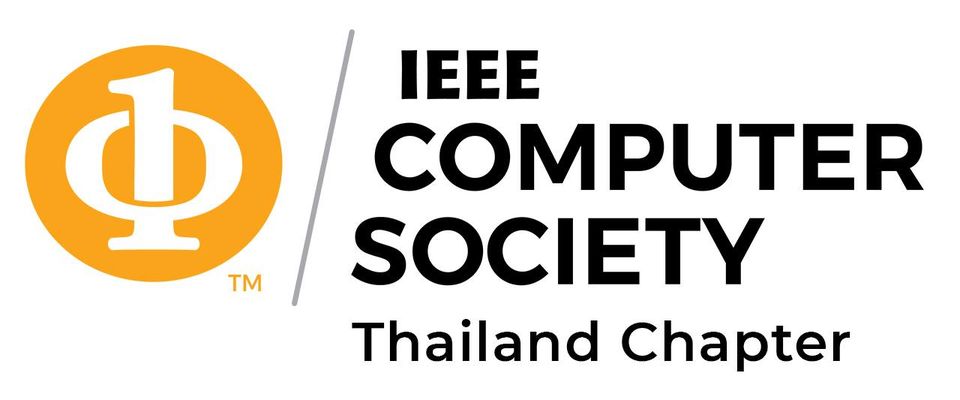
Our Sponsors









Contact Us
School of Information Technology, King Mongkut's University of Technology Thonburi
School of Information Technology, King Mongkut's University of Technology Thonburi
126 Pracha Uthit Rd., Bang Mod, Thung Khru, Bangkok 10140, Thailand.
- : iait2023@kmutt.ac.th
